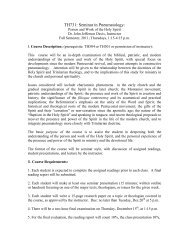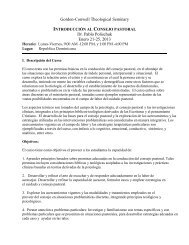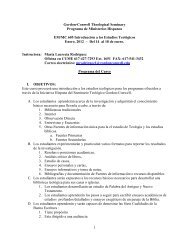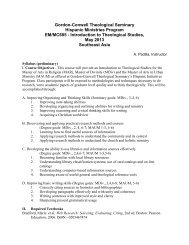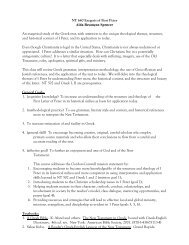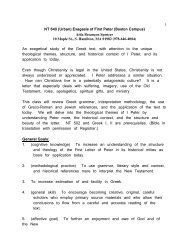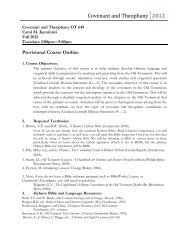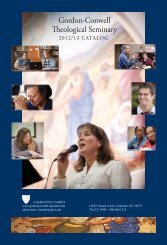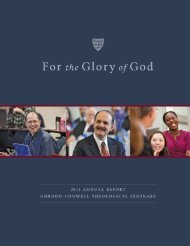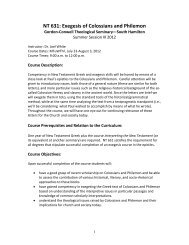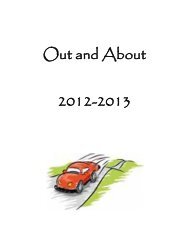1 TH607 Systematic Theology III1 Dr. Adonis Vidu avidu ...
1 TH607 Systematic Theology III1 Dr. Adonis Vidu avidu ...
1 TH607 Systematic Theology III1 Dr. Adonis Vidu avidu ...
Create successful ePaper yourself
Turn your PDF publications into a flip-book with our unique Google optimized e-Paper software.
<strong>TH607</strong> <strong>Systematic</strong> <strong>Theology</strong> III 1<br />
<strong>Dr</strong>. <strong>Adonis</strong> <strong>Vidu</strong><br />
<strong>avidu</strong>@gordonconwell.edu<br />
Office: Library, 109<br />
Office Hours @ theologyofficehours.wordpress.com<br />
Course description<br />
<strong>TH607</strong> <strong>Systematic</strong> <strong>Theology</strong> III<br />
Syllabus<br />
Spring 2011<br />
<strong>TH607</strong> is the capstone of the systematic theology classes at Gordon-Conwell. As a<br />
result, I am very intentional about making it an integrative experience. The<br />
following doctrines are explicitly covered: Holy Spirit and spiritual gifts, salvation,<br />
church and sacraments, eschatology and final states. A very important objective of<br />
this class is to find the coherence between these doctrines and the rest of systematic<br />
theology, but also their significance for Christian life.<br />
The doctrine of the person and work of the Holy Spirit grounds the rest of the<br />
discussion of soteriology, ecclesiology, and eschatology. A specifically Trinitarian<br />
Pneumatology is determinative for one’s understanding of the work of the Holy<br />
Spirit. On the other hand, a Trinitarian Christology leads to overcoming some of the<br />
oppositions between ‘merely’ forensic and participationist understandings of<br />
salvation (justification and sanctification). Moving into the doctrine of the church, a<br />
robustly Trinitarian theology will be shown to mediate between highly<br />
individualistic and highly institutionalized ecclesiologies.<br />
We shall be reading three impressive theologians which are very much in<br />
conversation with each other. They each come from different Christian traditions.<br />
John Zizioulas is a contemporary Eastern Orthodox theologian whose book, Being as<br />
Communion is one of the most influential theological books of the last two decades<br />
or so. Miroslav Volf comes from within the Free Church tradition (Pentecostal) but<br />
he strongly reacts against its individualism. Finally, Michael Horton represents the<br />
Reformed tradition of Protestant theology. We shall engage in an immensely<br />
stimulating conversation with these three theologians.<br />
The format of the class includes lectures, but also class-wide debates, as well as<br />
small-group discussion and processing. The student should bring her or his personal<br />
1 This version is still provisional. A final and definitive version will be provided on<br />
the first day of class. Potential changes will not affect the required reading and the<br />
evaluation.<br />
1
Bible. Although these activities are not graded, all students are required to<br />
participate in them.<br />
Learning outcomes<br />
2<br />
• To understand the systematic coherence of pneumatology, soteriology,<br />
ecclesiology, and eschatology.<br />
• To understand the differences between major Christian confessions on the<br />
respective topics.<br />
• To understand what is at stake in various soteriologies, including their<br />
practical implications for the life of the church.<br />
• To gain a better understanding of the distinctive role played by the Holy<br />
Spirit in salvation and the life of the church.<br />
• To gain a sense for the importance and reality of the church and its<br />
implications for the life of the congregation.<br />
• To understand various ecclesiological assumptions made by the variety of<br />
worship styles and liturgical traditions.<br />
• To gain an appreciation for the importance of catechetical formation for the<br />
life of the church.<br />
• To understand the implications of each of these topics for the following<br />
areas: evangelism, worship, missions, discipleship etc.<br />
Course outline<br />
1. The person of the Holy Spirit<br />
a. Person of the Spirit<br />
b. Gifts of the Spirit<br />
2. The work of the Holy Spirit<br />
3. Calvinism v. Arminianism (or rather, the Work of the Spirit cont.)<br />
a. Predestination<br />
b. Calling<br />
c. Perseverance<br />
4. Justification<br />
a. The New Perspective debate<br />
b. Faith and works<br />
5. Union with Christ<br />
a. Eastern Orthodox Perspectives<br />
b. The New Finish Interpretation of Luther<br />
6. The being of the church
a. The marks of the church<br />
b. Where is the church?<br />
Mid-term exam: 19-20 March.<br />
7. Sacraments: Baptism<br />
a. Infant Baptism<br />
b. Credo-Baptism<br />
8. Sacraments: The Eucharist<br />
a. Transubstantiation<br />
b. Consubstantiation<br />
c. Symbolic/Anamnetic view<br />
9. Church Governance<br />
a. Communion vs. institution<br />
b. Models of organization<br />
c. Women’s ordination<br />
10. Eschatology and final states<br />
a. Millennial views<br />
b. Creation and New Creation<br />
c. Soul, death, and resurrection<br />
d. Universalism<br />
e. Intermediary states<br />
Evaluation<br />
• 30% Reading report. The student will have to report the percentage of the<br />
reading she has completed. Due by the last day of written work.<br />
• 20% Midterm exam. The student will have to respond to 2 essay questions<br />
out of three choices. The list of possible midterm essay questions will be<br />
supplied on the first day of class.<br />
• 20% Final exam. Exactly the same conditions as the Midterm.<br />
• 30% Personal statement of faith. This is a reflective exercise, covering all<br />
three systematic theology classes, in which the student integrates all the loci<br />
into a coherent statement of faith. While biblical references are required, it is<br />
preferable to avoid proof-texting and refer instead to wider biblical theology.<br />
Length: minimal 5-8 pages, at 1 ½ spacing (feel free to go as long as you<br />
need: this exercise is primarily for your benefit). My grading criteria include:<br />
o Comprehensiveness: The full extent of systematic theology should be<br />
covered. Ability to see connections between various doctrines.<br />
o Clarity: I prize both conceptual as well as literary clarity.<br />
3
Required Reading<br />
4<br />
o Foundation: The ability to demonstrate the biblical bases for<br />
particular theological positions.<br />
o Suggestions for reflection:<br />
� Ministry implications<br />
� How has your theological position changed<br />
� Your position in relation to your denominational affiliation<br />
Books<br />
• Veli Matti Karkkainnen, An Introduction to Ecclesiology: Ecumenical,<br />
Historical, and Global Perspectives (IVP, 2002, 0830826882)<br />
• Walter A. Elwell, ed., Evangelical Dictionary of <strong>Theology</strong> (Baker, 2001,<br />
0801020751)<br />
• Gerald Bray, God is Love (Crossway, 2012, 1433522691)<br />
• Anthony Thiselton, The Hermeneutics of Doctrine (Eerdmans, 2007,<br />
0802826814)<br />
• Graham McFarlane, Why Do You Believe What You Believe about the Holy<br />
Spirit? (Wipf&Stock, 2009, 1606086227)<br />
Articles and Excerpts<br />
• Max Turner, The Holy Spirit and Spiritual Gifts (Hendrickson, 1998, excerpts:<br />
‘Cessationism and the New Testament Expectation’; ‘Towards a Trinitarian<br />
Pneumatology’)<br />
• Michael S. Horton, People and Place (WJK, 2008, excerpt)<br />
• Graham McFarlane, Why do You Believe What You Believe about the Holy<br />
Spirit? (Wipf & Stock, 2009, excerpt)<br />
• Roger Olson, Arminian <strong>Theology</strong>: Myths and Realities (IVP, 2006, excerpt)<br />
Additional bibliography<br />
Bartos, Emil. Deification in Eastern Orthodox <strong>Theology</strong>. Paternoster, 2007.<br />
Braaten, Carl E., and Robert W. Jenson. Union with Christ: The New Finnish<br />
Interpretation of Luther. Wm. B. Eerdmans Publishing Company, 1998.<br />
Christensen, Michael J., and Jeffery A. Wittung. Partakers of the Divine Nature: The<br />
History and Development of Deification in the Christian Traditions. Pbk. Ed.<br />
Baker Academic, 2008.<br />
Clowney, Edmund. The Church: Contours of Christian <strong>Theology</strong>. InterVarsity Press,<br />
1995.<br />
Dawn, Marva. A Royal "Waste" of Time: The Splendor of Worshipping God and Being<br />
Church for the World. Wm. B. Eerdmans Publishing Company, 1999.
D'Costa, Gavin. <strong>Theology</strong> and Religious Pluralism: The Challenge of Other Religions.<br />
Blackwell Publishers, 1986.<br />
Dunn, James D. G. Baptism in the Holy Spirit: A Re-Examination of the New Testament<br />
Teaching on the Gift of the Spirit in Relation to Pentecostalism Today.<br />
Philadelphia: Westminster Press, 1970.<br />
Jensen, David H., eds.. The Lord and Giver of Life: Perspectives on Constructive<br />
Pneumatology. Westminster John Knox Press, 2008.<br />
Federation, Lutheran World, Roman Catholic Church, and Catholic Church. Joint<br />
Declaration on the Doctrine of Justification. Wm. B. Eerdmans Publishing<br />
Company, 2000.<br />
Frame, John M. Salvation Belongs to the Lord: An Introduction to <strong>Systematic</strong> <strong>Theology</strong>.<br />
P & R Publishing, 2006.<br />
Gaffin, Richard B., Jr. Perspectives on Pentecost. P & R Publishing, 1979.<br />
Green, Michael. I Believe In The Holy Spirit. Revised. Wm. B. Eerdmans Publishing<br />
Company, 2004.<br />
Grudem, Wayne A. The Gift of Prophecy in the New Testament and Today. Crossway<br />
Books, 2000.<br />
Heron, Alasdair. The Holy Spirit. Philadelphia: Westminster Press, 1983.<br />
Hinze, Bradford E., and D. Lyle Dabney. Advents of the Spirit: An Introduction to the<br />
Current Study of Pneumatology. Marquette University Press, 2001.<br />
Hoekema, Anthony A. The Bible and the Future. Wm. B. Eerdmans Publishing<br />
Company, 1994.<br />
Husbands, Mark, and Daniel J. Treier. Justification: What's at Stake in the Current<br />
Debates. InterVarsity Press, 2004.<br />
Karkkainen, Veli-Matti. One with God: Salvation As Deification and Justification.<br />
Liturgical Press, 2005.<br />
Ladd, George Eldon. Presence of the Future: The Eschatology of Biblical Realism. Wm.<br />
B. Eerdmans Publishing Company, 1996.<br />
McGrath, Alister E. Iustitia Dei: A History of the Christian Doctrine of Justification. 3rd<br />
ed. Cambridge University Press, 2005.<br />
5
McIntyre, John. The Shape of Soteriology: Studies in the Doctrine of the Death of<br />
6<br />
Christ. Edinburgh: T&T Clark, 1992.<br />
Mclntyre, John. The Shape of Pneumatology: Studies In The Doctrine Of The Holy<br />
Spirit. T. & T. Clark Publishers, 2004.<br />
Murray, John. Redemption Accomplished and Applied. Wm. B. Eerdmans Publishing<br />
Company, 1984.<br />
Newbigin, Lesslie. The Gospel in a Pluralist Society. Wm. B. Eerdmans Publishing<br />
Company, 1989.<br />
Oden, Thomas C. The Justification Reader. Wm. B. Eerdmans Publishing Company,<br />
2002.<br />
Ritschl, Albrecht. The Christian Doctrine of Justification and Reconciliation: The<br />
Positive Development of the Doctrine. BiblioLife, 2008.<br />
Rogers, Eugene F. After The Spirit: A Constructive Pneumatology From Resources<br />
Outside The Modern West. Wm. B. Eerdmans Publishing Company, 2005.<br />
Royce, Josiah. The Hope of the Great Community. New York: Macmillan, 1916.<br />
Russell, Norman. The Doctrine of Deification in the Greek Patristic Tradition. Oxford<br />
University Press, USA, 2006.<br />
Schwarz, Hans. Eschatology. Wm. B. Eerdmans Publishing Company, 2000.<br />
Shults, F. LeRon, and Andrea Hollingsworth. The Holy Spirit. Wm. B. Eerdmans<br />
Publishing Company, 2008.<br />
Turner, Max. Power from on High: The Spirit in Israel's Restoration and Witness in<br />
Luke-Acts. Sheffield Academic Press, 1996.<br />
---. The Holy Spirit and Spiritual Gifts: In the New Testament Church and Today.<br />
Revised. Hendrickson Publishers, 1998.



